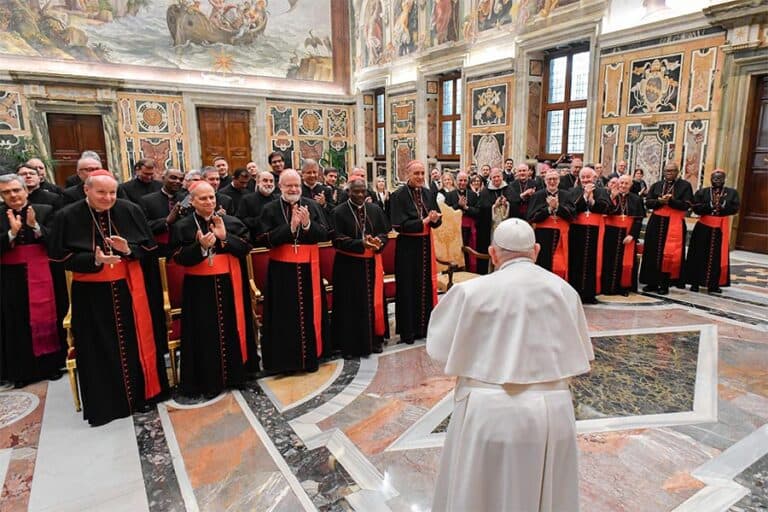ROME – Amid the ongoing furor over a recent Vatican declaration on the blessing of same-sex couples, Pope Francis on Friday appeared to try to rein in certain interpretations of the document, insisting that what’s at issue is a pastoral gesture directed at the people involved and not their union itself.
Speaking to members of the Vatican’s Dicastery for the Doctrine of the Faith (DDF) Jan. 26, Francis said the intention of offering “pastoral and spontaneous blessings” to couples in irregular situations, including same-sex couples and divorced and remarried couples, is to express pastoral closeness.
The decision, he said, is intended “to concretely show the closeness of the Lord and of the Church to all those who, finding themselves in different situations, ask for help to carry on – sometimes to begin – a journey of faith.”
To this end, he stressed that “these blessings, outside of any liturgical context and form, do not require moral perfection to be received.”
He also insisted that “when a couple spontaneously approaches to ask for is, the union is not blessed, but simply the people who have requested it together. Not the union, but the people, naturally taking into account the context, the sensitivities, and the places in which one lives and the most suitable ways to do so.”
Pope Francis spoke to members of the DDF, led by Cardinal Víctor Manuel Fernández, during their plenary assembly.
His remarks came against the backdrop of ongoing controversy caused by DDF Declaration “Fiducia Supplicans: On the Pastoral Meaning of Blessings,” published Dec. 18 and which authorizes pastors to give spontaneous, non-liturgical blessings to couples in irregular situations, including divorced and remarried couples and those in same-sex unions.
After the declaration’s publication, there was an explosion of backlash from critics, who accused the pope of sowing confusion about Catholic teaching on marriage and human sexuality, while supporters hailed the move as a significant step forward in the pastoral outreach to the LGBTQ+ community.
As Fernández scrambled to offer clarification first in several media interviews and then a press release from the DDF earlier this month, bishops throughout the world had mixed reactions.
Some bishops conferences welcomed the move, while others, notably the entirety of Africa, have refused to give blessings to same-sex couples, as a pair or as individuals, citing cultural sensitivities and the possibility of creating confusion.
Amid the backlash over Fiducia Supplicans, a petition has been penned calling on Fernández to resign and prominent churchmen, including Chinese Cardinal Joseph Zen, have said the document “creates confusion” and ought to be retracted.
In his speech Friday, Pope Francis said the DDF’s task is to aid him in proclaiming the Gospel and in both protecting and promoting the integrity of Catholic faith and morals throughout the world as the Church seeks “an ever-deeper intelligence in the face of new issues.”
Francis said this is why he divided the DDF into two, doctrinal and disciplinary sections, and to give the department a new task of engaging in theological dialogue, rather than exclusively punishing error, which he spelled out in a letter to Fernández after his appointment last summer.
On one hand, the pope stressed the importance of having competent professionals in the disciplinary section of the DDF “to ensure attention and rigor in the application of current canonical legislation,” especially in managing cases of the sexual abuse of minors by priests.
He also insisted on the need to give greater space and attention to doctrinal issues, saying, “there is no shortage of trained theologians and qualified personnel.”
Pope Francis then reflected on the topics of the sacraments, dignity and faith as important aspects of the DDF’s daily work, saying faith is nurtured and grows thanks to the sacraments, and that for this reason, “particular care is requested of ministers in administering them and in disclosing to the faithful the grace that they communicate.”
On the topic of dignity, he said that Christians must never tire of promoting “the primacy of the human person” the defense of human dignity “beyond all circumstances.”
To this end, he noted that the DDF is currently preparing a document on human dignity and voiced hope that it would help the Church “to always be close to all those who, without proclamations, in concrete everyday life fight and pay personally to defend the rights of those do not count and ensure that…we are able to react with a new dream of fraternity and social friendship that is not limited to words.”
In terms of the faith, Francis pointed to the publication of his exhortation Evangelii Gaudium, “The Joy of the Gospel,” in 2013, and the upcoming Jubilee of Hope in 2025, “in which we will renew our faith in Jesus Christ, true God and true man, hope of history and of the world.”
Noting that the practice of faith is diminishing in many parts of the world, he said it is necessary to deepen reflection on issues such as “the communication of faith in today’s world, especially to the younger generations; the missionary conversion of ecclesial structures and pastoral agents; the new urban cultures, with their burden of challenges but also with unprecedented questions of meaning,” and the centrality “of the kerygma in the life and mission of the Church.”
The DDF can help in this regard, he said, saying to safeguard the faith in the current context means reflecting and discerning, “so that the entire community works toward a real kerygmatic pastoral and missionary conversion.”
“What is most essential, most beautiful and most attractive and at the same time most necessary for us is faith in Jesus Christ,” he said, stating the Church will renew this faith during the upcoming jubilee, and that each Christian “is called to announce it to every man and every woman of the earth. This is the fundamental task of the Church.”
Follow Elise Ann Allen on X: @eliseannallen










